August 30, 2015 at 6:26 pm
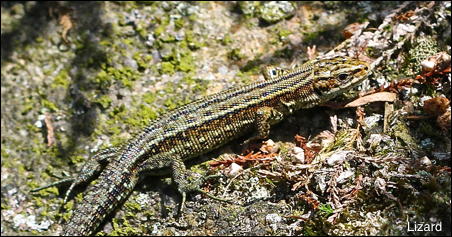
The hot and cold spells of weather this summer has resulted in periods of activity from the Pennine reptiles. One day I found six Lizards enjoying the morning sun but better still on another early morning I had twelve female Adders out in the open. This is the most Adders I have ever found in one locality in the Pennines and they are obviously having a good season. One of the reasons for this could be the same one that produced the best breeding season for years for Short Eared Owls and Long Eared Owls – an abundance of voles. Adders feed on voles extensively and one vole will keep an Adder going for weeks. click here
Swifts are now migrating south with one over the house on the 18th. In the meantime the local farm still had Swallows feeding five young in a nest on the 29th August.
August 23, 2015 at 8:33 pm
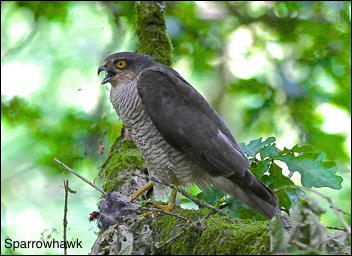
This week’s photo is of a male Sparrowhawk with prey before he presents it to the female at the nest. He had caught this bird in our garden and I followed him across into Hopwood woods where his nest was located. Three young have now fledged and are flying around calling excitedly. Sparrowhawks time their breeding season so that when they need most food there is an abundance of young birds available. Unfortunately that means he hunts our garden regularly to catch the juvenile Goldfinches, Greenfinches and Sparrows that are now feeding.
Over the years I have filmed many different Sparrowhawks in the garden and this week’s gallery shows some of them . Click here
The star garden bird of the week was a female Blackcap feeding on the honeysuckle berries.
The big event of the weekend has been the Birdwatchers Fair at Rutland Water. One day is now not long enough to see everything and I would recommend it to everyone who has never been to go next August when it returns.
August 16, 2015 at 1:20 pm
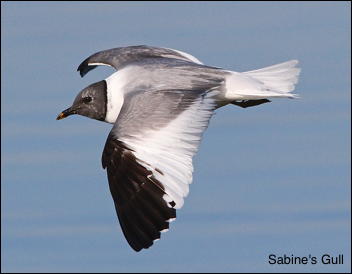
I have never classed myself as a twitcher but there are some birds that I would travel a few miles to see. One of those is a Sabine’s Gull that normally stays in the high Arctic. My three previous sightings have been in Spitsbergen, Alaska and Greenland so one at Pennington Flash was a bit of a shock especially as I could not see any ice anywhere!
It was a second summer bird so lacked the full yellow on the bill and the red ring around its eye but was still a cracking bird to photograph in perfect conditions Click here. Two days later there was high drama when a Pike grabbed the gull and pulled it underwater to eat! However it hadn’t come all the way from the high Arctic for nothing and fought back to the surface and flew off! It was blooded and nervous for a while but is now back to normal and still coming to bread at Pennington Flash. Good luck to it.
During the week the garden has been full of juvenile birds, including Bullfinches. In Hopwood woods a Green Woodpecker was vocal and three young Sparrowhawks were on their wing. On the 14th more than one hundred House Martins were feeding close to the tree tops.
August 9, 2015 at 7:59 pm
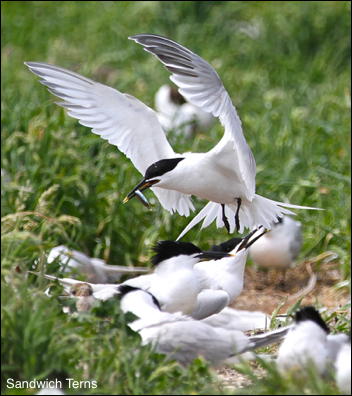
One of the bonuses of visiting the Farne Isles for Puffins is that there are good opportunities for filming Sandwich Terns and other sea-birds. Each year on Inner Farne there is a very accessible colony of Sandwich Terns that you can film from the footpath. Arctic Terns are everywhere and will readily attack so a head cover is essential. One word of warning is that by late August the seabirds have finished breeding and flown back out to sea. Click here
The big event this week-end has been the Hen Harrier day in the Goyt valley. I joined hundreds of other people to give my support to the stopping of the slaughter of this magnificent raptor by gamekeepers. It was good to meet many supporters who have watched my films and DVDs. Chris Packham gave an impressive presentation.
August 2, 2015 at 4:29 pm
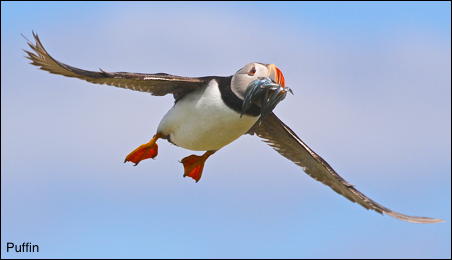
It is more than twenty years since I last visited a major seabird colony and I had almost forgotten how spectacular they can be. During that brief spell of hot weather in late June I decided that it was time to visit the Farne Isles to capture flight shots of Puffins carrying fish. Something that was almost impossible to do in the pre digital age.
The Farne Isles must be the most accessible major sea-bird colony in Britain with plenty of boats taking visitors from Seahouses every day. With boat fares and National Trust landing fees it is not a cheap day out but for anyone who has never visited before it is an unforgettable experience. Long before you arrive on the islands the smell of guano percolates through the air and then the clamour of thousands of seabirds greets you as you step ashore. Puffins flying in every direction carrying fish was just what I wanted and it is amazing how quickly five hours can go by when you are engrossed in filming
In 1960, when I was a keen fourteen year old bird-watcher, I was taken on a day trip to Skomer Island in Pembrokeshire. The spectacle of that one day out has stayed with me forever and I would recommend it to anyone interested in wildlife. Click here






